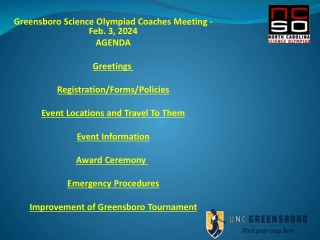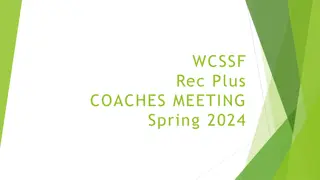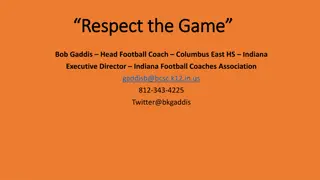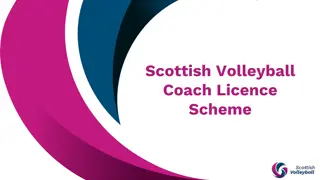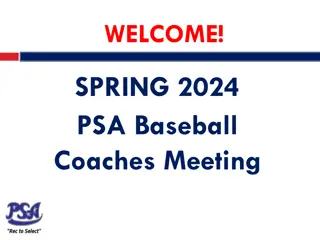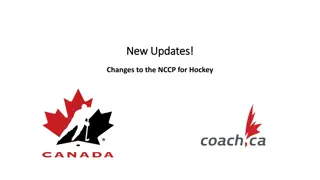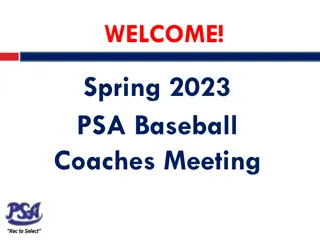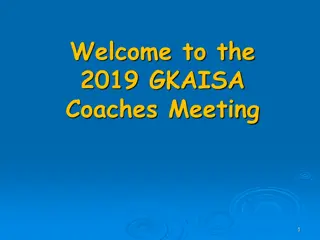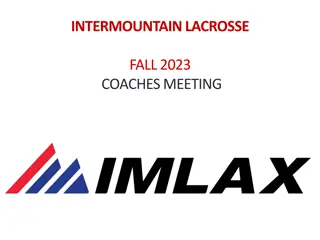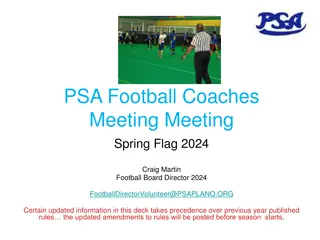
Empowering Older Foster Youth Through Transition Support Programs
Discover how programs like the Youth In Transition (YIT) are aiding older youth in foster care with services like education support, vocational training, housing assistance, and more to help them successfully transition to independence. Learn about the eligibility criteria, funding options, and the various resources available through YIT.
Download Presentation

Please find below an Image/Link to download the presentation.
The content on the website is provided AS IS for your information and personal use only. It may not be sold, licensed, or shared on other websites without obtaining consent from the author. If you encounter any issues during the download, it is possible that the publisher has removed the file from their server.
You are allowed to download the files provided on this website for personal or commercial use, subject to the condition that they are used lawfully. All files are the property of their respective owners.
The content on the website is provided AS IS for your information and personal use only. It may not be sold, licensed, or shared on other websites without obtaining consent from the author.
E N D
Presentation Transcript
SERVICES FOR OLDER YOUTH IN FOSTER CARE Higher Education Consortium 2023
Youth In Transition (YIT) Program A priority of the Michigan Department of Health and Human Services (MDHHS) is to improve the success of foster youth transitioning into adulthood from the state s foster care system. The goal is to help young adults make the transition from foster care to independence, which is the ability to take care of oneself physically, socially, economically, and psychologically. Federal law mandates that state and local governments offer an extensive program of education, training, employment, and financial support for a young person leaving foster care. Independent Living (IL) is an ongoing process of maturation, skill development, and assuming responsibility for self. IL services should provide practical experiences that are designed to assist youth in developing the skills needed for a successful transition to adulthood. YIT is derived from Federal funding called Chafee . The John H. Chafee Foster Care Independence Program (CFCIP) offers assistance to help current and former foster care youth achieve self-sufficiency. Allocated to States who then allocate to local county child welfare offices.
Youth in Transition (YIT) Funding YIT Eligibility Open Case YIT Eligibility Closed Case Youth has an open foster care case after their 14thbirthday and is placed in an eligible placement. Youth had an open foster care case after their 14thbirthday. And Or Youth is currently between the ages of 18 and 23 (ineligible on their 23rdbirthday). Youth has an open delinquency case after their 14thbirthday and is placed with MDHHS in a supervised foster care placement. Or Youth is currently between the ages of 16 and 17 AND utilized YIT funding prior to case closure. And Youth is currently between the ages of 14 and 23 (youth becomes ineligible on their 23rd birthday).
What can YIT be used for? Education Pre-College Vocational/Employment Career Exploration/Job Placement/Retention Vocational equipment Interview Clothing State identification card or driver s license Certification course Uniforms and Footwear License/certification fees Books & Supplies Tutoring, Internships ACT/SAT Testing GED Preparation/ Testing Extracurricular activities/Sports /Clubs School sponsored educational field trips Senior Pictures/Class Rings/Senior Dues/Yearbooks /cap and gown (some expenses are reimbursable by case services, YIT can pay for the balance) Summer school to retake a class or to accelerate studies
Housing Lifetime Limit of $1,500 for first month s rent/security for youth age 18 and older who reached age 18 while in foster care Start-Up Goods What can YIT be used for Lifetime Limit of $1,000 for start up goods for youth 18 and older who reached age 18 while in foster care Lifetime limit $500 for baby related items for youth age 18 and older who reached age 18 while in foster care Transportation For education and/or employment goals Driver s Training Vehicle Purchase Lifetime Limit $5,000 Vehicle Repair Lifetime Limit $900 Vehicle Insurance Lifetime Limit up to 6 months of coverage Bus Cards Mileage for volunteer transporters Computer/Laptop/Tablet Lifetime Limit $1,500 (accompanying software, printer carrying case etc.)
HOW YOUTH APPLY FOR YIT FUNDING
Foster Youth in Transition - Foster Youth in Transition (michigan.gov) If open case, case worker should apply for funding for youth. Funding availability determined by county of jurisdiction. Or If closed case, the county or state in which the youth currently resides is responsible for providing closed case YIT services. Funding availability determined by county of residence.
History of MYOI Began as a partnership between Jim Casey Youth Opportunities Initiative (Jim Casey) and MDHHS in 2002 Two sites: Northern cluster of ten counties and Wayne Focused on Jim Casey s five core strategies: Youth Engagement Partnerships and Resources Research Evaluation Public Will and Policy Increased Opportunities The program was created to improve outcomes for youth transitioning from foster care to adulthood. It brings together community members, public and private agencies, and resources that are critical to enhancing the success of young adults.
Youth Leadership boards Independent Living Skills Component of MYOI Programming Community Partnership Boards Banking Stipends and Matches Evaluation
MICHIGAN YOUTH OPPORTUNITIES INITIATIVE (MYOI) 42 Coordinators cover 83 Counties in the State of Michigan
Our Coordinators Provide Assistance and Guidance to youth currently and formerly in the foster care system Aid youth in developing connections and gaining independent and interdependent life skills Provide technical assistance to foster care staff Coordinate and Deliver Independent Living Services Develop Community Partnerships Financial Tracking Develop Youth Advisory Boards
What are the Benefits? 2 3 1 Young people gain confidence as they save to purchase assets that are important to meeting key developmental milestones, such as cars to get to school or work, educational expenses and housing-related costs. Young people form relationships with peers and adult supporters and learn how to access community resources that are important in their preparation for adulthood Young people learn financial capability skills that are critical as they take on adult responsibilities, often without the guidance and support of their parents or other adult caregiver
Health & Prevention Housing Life & Social Skills Employment Financial Capability Community Engagement Education Relationships MYOI provides training opportunities to develop youth skills and improve outcomes in the areas of: Education Employment Housing Physical and mental health Permanency Social and community engagement MYOI provides opportunities for participating youth to develop advocacy and leadership skills through monthly youth board meetings MYOI sites develop community partnerships and, in some cases, Community Partnership Boards consisting of local community members and businesses interested in building community support for all foster youth All MYOI enrolled youth complete Financial Literacy Training and are encouraged to open two bank accounts, one of which is a protected savings account that can later be matched for the purchase of an asset
Semi Semi- -Annual Transition Meeting Annual Transition Meeting o Beginning at age 14, semi-annual transition meetings must occur once every 6 month to discuss a youth s permanency plan, identify supportive adults, and make plans to meet specific goals set by the group. o The DHS-901 form, completed by the facilitator, addresses all areas to be discussed at the meeting, including: Housing. Supportive relationships. Independent living skills. Education. Employment. Transportation. Financial management skills. Review of the youth s credit report. Emotional/mental/physical health. Substance abuse.
Any youth leaving foster care at age 16 and older are required to have a 90-Day Discharge meeting 3 months prior to expected case closure. The 90-Day Discharge Plan should address the same areas as the Semi-Annual Transition Plan meeting, and include all the last steps needed prior to the youth s case closing. 90 90- -Day Day Discharge Discharge Meeting Meeting Discharge documents are discussed and plans are made for the youth to have all needed items by the time the case is closed, such as birth certificate, social security card, verification of foster care for financial aid purposes, medical passport, immunization record, etc.
Both the Semi-Annual Transition Meeting and the 90-Day Discharge meeting should be youth led, and include people who the youth views as a support. People who may be represented on the team include, but are not limited to: Foster parents. Biological parents. Relatives. Court Appointed Special Advocate (CASA). Lawyer guardian ad litem. Michigan Youth Opportunities Initiative (MYOI) coordinator. Therapists. The youth s friends. School staff (teacher, coach, counsel, foster care liaisons). Employers. The youth's supportive adult Tribal representatives for American Indian children. Anyone the youth considers to be a support person. Semi Semi- - Annual & Annual & 90 90- -Day Day Discharge Discharge Meetings Meetings
Young Adult Voluntary Foster Care (YAVFC) Young Adult Voluntary Foster Care (YAVFC) Michigan allows youth to stay in foster care until the age of 21 under the Young Adult Voluntary Foster Care Program (YAVFC) Youth can enter YAVFC at 18. Youth must be either be enrolled in an education program, working or volunteering for 80 hours per month, or medically incapable of doing any of the previous. Youth receives a monthly stipend ($25.52) per day to help with rent and living expense. Youth can leave and re-enter until the 21st birthday. There is no ongoing court involvement for youth in YAVFC.
Actively completing high school or a program leading to a general equivalency diploma (GED), as certified by the high school or GED program. Workers cannot require a minimum level of attendance or minimum GPA. YAVFC YAVFC Program Program Requirements Requirements OR Enrolled at least part-time in a college, university, vocational program, or trade school as certified by the post-secondary institution. Workers cannot require a minimum level of attendance or minimum GPA. OR
Employed or participating in a program that promotes employment (such as Job Corps, Michigan Works!, or another employment skill-building program). Participation must be at least 80 hours per month and may be at one or more places of employment and/or in a combination with volunteering. YAVFC YAVFC Program Program Requirements Requirements cont. cont. OR Volunteering for a community organization for at least 80 hours per month, or in combination with employment to meet minimum eligibility requirements. OR Incapable of the above educational or employment activities due to a documented medical condition.
If not meeting school or work requirements, youth enter a 30-day grace period. Grace Grace Periods Periods All payments and services are provided during that 30 days. If still not meeting requirements on the 31st day, case closes with the option to re-open once meeting requirements.
Foster Care Transitional Medicaid (FCTMA) Foster Care Transitional Medicaid (FCTMA) Foster Care Transitional Medicaid (FCTMA) is the Michigan Medicaid program established for youth who transition out of the foster care system after age 18. Youth who were in foster care, in an out-of-home placement, when they turned 18 are categorically eligible for FCTMA and will remain eligible until they turn 26 unless they move out of state. Automatic referral is made by the case work worker at the time of care is closing. The only responsibility of the youth should be that the case worker has the up-to-date address. Benefits include doctor visits, health exams, dental exams and treatment, vision services, prescriptions, mental health services, inpatient/outpatient hospital care, immunizations, family planning, prenatal care and delivery, inpatient/outpatient surgery, 24-hour emergency care, lab tests, x-rays, and more. As of January 1, 2023, youth who were in care in another state are now eligible for FCTMA. More information can be found on the Frequently Asked Questions at: https://www.michigan.gov/documents/fyit/FAQ_FosterCare_Transitional_Medicaid_338956_7.pdf
o Any youth age 16 and older who does not have a Michigan driver's license should obtain a State of Michigan identification card. The caseworker must assist the youth with obtaining an identification card from the local Secretary of State office. o MDHHS has collaborated with the Secretary of State to address barriers to youth in foster care obtaining their driver s license or State ID. This collaboration has resulted in: State State Identification Identification Requirement Requirement MiSACWIS printout of youth social security number in leu of copy of social security card Letter from caseworker to verify residency
Free Application for Federal Free Application for Federal Student Aid (FAFSA) Student Aid (FAFSA) o Foster youth are considered independent students. o Question #53: At any time since you turned 13, were both of your parents deceased, were you in foster care or were you a dependent or ward of the court? o DHS-945 Verification of Court/State Ward Status. o Contact the foster care case worker or the Education Analyst for completed form. 23
o Eligible if you receive Medicaid for 24 months in a 36 consecutive month period after the age of 9. o Phase I: Pays tuition and mandatory fees for an associates degree or certificate program. Tuition Tuition Incentive Incentive Program Program (TIP) (TIP) o Phase II: Pays $500 per semester towards a bachelors degree ($2,000 total). o Youth in foster care automatically are put on Medicaid while in care and therefore are TIP eligible. o Only for identified Michigan colleges and universities.
Provides up to $5000 per fiscal year to assist with college and living expenses. For youth who are/were in foster care under the supervision of MDHHS or have/had a delinquency case and were placed in an eligible child care placement under supervision of MDHHS. Must have been in care on or after 14th birthday If adopted from care, must have been on or after the 16th birthday. If placed in relative guardianship, from foster care, must have been on or after the 16th birthday. Complete the ETV application on-line at: https://mietv.samaritas.org/ or call 1-877-660-6388. Education Education and and Training Training Voucher Voucher (ETV) (ETV)
o Scholarship available for students attending a Michigan public or private degree granting 4- year university or community college: o Student must have been in foster care after the 13th birthday. o No upper age limit. o Must be completing an undergraduate degree. o Priority Deadline is August 1th for the following school year. o www.michigan.gov/setwithmet Fostering Fostering Futures Futures Scholarship Scholarship
National Youth in Transition Database National Youth in Transition Database What is National Youth in Transition Database (NYTD)? The National Youth in Transition Database is a federal reporting system that collects information about the independent living services provided to youth in foster care and the outcomes resulting from these services. Services provided to youth aged 14 and older and documented in MiSACWIS are collected to identify the numbers of services provided youth and the types of services offered to youth. Eligible youth are initially surveyed as part of a cohort at 17 years of age with the Baseline Survey. These youth are then asked to complete a Follow-Up Survey at 19 and 21. Through this process, the effectiveness of the foster care system in helping youth transition to adulthood can be assessed and areas where changes are needed to improve the transition experiences of all foster youth can be identified.
NYTD Implications for Future Focus Educational Attainment Homelessness Data Collection Family Planning Employment
CONTACT US WITH QUESTIONS BRANDI MCKENZIE MCKENZIEB@MICHIGAN.GOV ANN ROSSI ROSSIA@MICHIGAN.GOV

